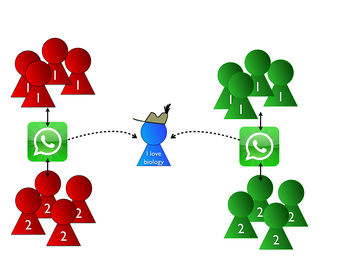INQUIBIDT at UCAM: Unterschied zwischen den Versionen
(→BioScrabble as an example of an INQUIBIDT GeoGame) |
|||
| (24 dazwischenliegende Versionen von einem Benutzer werden nicht angezeigt) | |||
| Zeile 1: | Zeile 1: | ||
| − | |||
| − | |||
| − | |||
| − | |||
===BioScrabble as an example of an INQUIBIDT GeoGame=== | ===BioScrabble as an example of an INQUIBIDT GeoGame=== | ||
| Zeile 8: | Zeile 4: | ||
The goal is to '''discover''' and to '''inquire biodiversity''' of a specific site ideally directly '''at the doorstep'''. | The goal is to '''discover''' and to '''inquire biodiversity''' of a specific site ideally directly '''at the doorstep'''. | ||
| − | Several tasks are hidden in an area and they can be found with the help of a Google map. The tasks are provided on a online repository which can be accessed via QR-Codes | + | Several tasks are hidden in an area and they can be found with the help of a '''Google map'''. |
| − | + | The tasks are provided on a '''online repository''' which can be accessed via '''QR-Codes'''. | |
| − | + | ||
| − | + | The challenge is... | |
| − | + | 1. find the QR codes | |
| − | + | 2. solve the task. | |
| − | + | Each of the provided '''answers contains a letter''' and the result of all correctly answered questions is '''solution word''' or '''sentence'''. | |
| − | + | Learners are divided into '''two teams''' playing against each other. Each group is again divided into several '''sub-groups''' communicating and collaborating using smartphones via the app '''What's app'''. | |
| − | + | ||
| − | + | The sub-groups '''find''' the location-based tasks, '''scan''' the QR-code and '''answer''' the questions correctly. Thus, the sub-group receives a letter which they '''sent''' to the other sub-groups of a team via What's app or another messenger (e.g. sub-group one of red team). | |
| + | Winner is the team which sends the solution first to the BioScrabble refree. | ||
| + | Here you find the [[Cambridge BioScrabble 2013]] at the botanic garden. | ||
| + | |||
| + | [[Datei:Homerton.jpg|x110px|Homerton college]] | ||
| + | <!-- | ||
---- | ---- | ||
| + | |||
===What the Cambridge University Students created....=== | ===What the Cambridge University Students created....=== | ||
| + | |||
| + | |||
| + | The PGCE Science Education students attended a course following the INQUIBIDT-approach. | ||
| + | |||
| + | As result, two challenging location-based learning paths were developed for the campus of HOMERTON college. | ||
| + | |||
| + | Here the two tours can be assessed: | ||
| + | |||
| + | [[UCAM tour1]] | ||
| + | |||
| + | [[UCAM tour2]] | ||
| + | --> | ||
Aktuelle Version vom 13. Juni 2014, 09:08 Uhr
BioScrabble as an example of an INQUIBIDT GeoGame
BioScrabble is a game-like activity for location-based learning in out-of school-settings.The goal is to discover and to inquire biodiversity of a specific site ideally directly at the doorstep.
Several tasks are hidden in an area and they can be found with the help of a Google map. The tasks are provided on a online repository which can be accessed via QR-Codes.
The challenge is...
1. find the QR codes
2. solve the task.
Each of the provided answers contains a letter and the result of all correctly answered questions is solution word or sentence.
Learners are divided into two teams playing against each other. Each group is again divided into several sub-groups communicating and collaborating using smartphones via the app What's app.
The sub-groups find the location-based tasks, scan the QR-code and answer the questions correctly. Thus, the sub-group receives a letter which they sent to the other sub-groups of a team via What's app or another messenger (e.g. sub-group one of red team).
Winner is the team which sends the solution first to the BioScrabble refree.
Here you find the Cambridge BioScrabble 2013 at the botanic garden.



